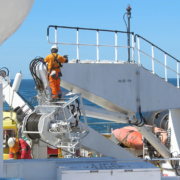The Connection Between Vibration Exposure and Health Issues Among Maritime Workers
Vibration exposure is among the many dangers that maritime workers face in their daily work. It’s frequently overlooked since the effects of vibration can take years or decades to become obvious. There are research-proven connections between vibration exposure and a wide range of health issues. It is important for maritime workers in the Mobile area to know their rights and seek compensation if they are injured at work.
If you’ve suffered health issues as a result of vibration exposure in a maritime setting, you could be entitled to compensation. Call Fuquay Law Firm at 251-473-4443 to set up a consultation with our team now.
Common Sources of Vibration in the Maritime Industry
Large vessels rely on heavy-duty machinery and engines to keep them running. The engine room is a common source of intense vibration, so anyone who works in this vicinity is at significant risk of ongoing vibration exposure. This includes engineers, mechanics, and repair personnel.
Maritime work also involves a range of power tools and equipment, including drills and grinders. Those who use these tools may have intense vibration transmitted directly to their hands and arms, leading to pain, numbness, and mobility limitations.
If your work involves cargo loading and handling, you may use heavy equipment to transport cargo safely. Cranes, forklifts, and other similar tools can expose workers to ongoing vibration. Since this work tends to be fairly repetitive, those who do this type of work are often exposed to vibration day after day, compounding the damage.
Your Health and Prolonged Vibration Exposure
Ongoing exposure to vibration can have a detrimental effect on your health. Much depends on how you’re exposed to vibration, your distance from the source of the vibration, the amount of time you’re exposed, and any preventative measures you take to minimize the damage. Some common health issues associated with vibration exposure include:
- Hand-arm vibration syndrome: This assortment of vascular, sensory, and musculoskeletal issues is associated with the use of vibrating handheld tools. This diagnosis is mostly seen among those who use drills, grinders, and other handheld equipment, versus those who are exposed to indirect vibration.
- Whole-body vibration health issues: Those who experience whole-body vibration from a ship’s engines and machinery may suffer various health issues. Musculoskeletal issues are particularly common, often affecting the lower back or leading to spinal injuries.
- Hearing loss: Hearing loss is a devastating health issue that often follows prolonged vibration exposure. It’s particularly insidious because it takes time to become apparent. By the time a maritime worker’s hearing loss is bad enough for others to notice, significant damage has already been done.
- Circulatory problems: Circulatory issues may result from vibration exposure. One such issue is Raynaud’s phenomenon. This health issue leads to decreased blood flow to the fingers, toes, nose, and other areas. Raynaud’s phenomenon causes blood vessel spasms in the affected areas, generally the result of cold or stress.
Safety Measures to Prevent Permanent Damage
Maritime employers have an obligation to their workers to limit their exposure to vibration and other dangers. With anti-vibration technology and other engineering measures, employers may be able to limit the transmission of vibrations both to those who work directly with equipment and those in the vicinity. Workers should also use personal protective equipment whenever they are at risk of excessive vibration exposure.
It is important to prioritize safety in training, both for new employees and long-time workers. When workers are aware of the risks of vibration exposure, they are more likely to use appropriate PPE and take steps to mitigate their exposure.
When employees are injured, they must take steps to pursue the compensation they’re owed. There are numerous laws that protect maritime workers and allow them access to medical care and income replacement benefits. The Jones Act, the Longshore and Harbor Workers’ Compensation Act, and general maritime law are all avenues to explore with the help of a Mobile maritime injury lawyer.
Contact Fuquay Law to Explore Your Maritime Injury Claim Options
With the team at Fuquay Law Firm, you can feel confident knowing that your maritime injury claim is in good hands. Our focus on maritime injuries has given us an in-depth understanding of this area of law, allowing us to focus on helping injured workers like you. Start your claim now by calling us at 251-473-4443 or contacting us online.












Leave a Reply
Want to join the discussion?Feel free to contribute!